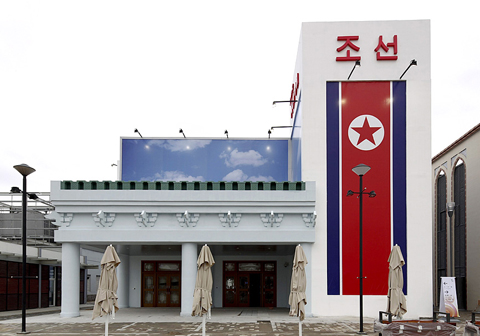North Korea, Sudan, Iran, Myanmar, Zimbabwe are not normally countries associated with booming economies or positive public perceptions, especially in the West.
However, they all have close ties with China, and have made every effort to put on a good show at the just opened Shanghai Expo, an expensive event being held in China’s commercial hub over the next six months.
North Korea and Iran, memorably linked by former US president George W. Bush as part of an “axis of evil,” even have their national “pavilions” right next to each other.

PHOTO: REUTERS
North Korea, whose nuclear weapons program has strained ties with China, its only real ally, is taking as its theme “Paradise for the People,” brushing aside the power cuts and food shortages that have afflicted the isolated nation.
North Korean official Lee Song-un told China’s Xinhua news agency in March that this was the first time the country had attended an Expo, choosing China’s financial hub and most cosmopolitan and richest city to do so.
“The pavilion will show off the ‘garden city’ of Pyongyang, and reflect the characteristic style of the North Korean people’s spirit in building a powerful and prosperous country,” Lee said.
North Korea’s No. 2 leader, Kim Yong-nam, turned up in person for the Expo’s dazzling opening ceremony.
It is not clear how North Korea, whose economy is in tatters and subject to tough international sanctions, has paid for the building, decorated with a large national flag on the outside and a replica of Pyongyang’s Juche Tower inside.
Pictures and film inside show happy people ice skating and otherwise enjoying themselves.
There is an advertisement for a North Korean restaurant in Shanghai, and a stall selling souvenirs, including stamps, DVDs and children’s books in English with titles such as Boys Wipe Out Bandits.
“The North Korea pavilion feels oppressive inside. I’m not sure why,” said Liu Hongqiao, a visitor from Shanghai’s neighboring province of Zhejiang.
“Maybe because their staff are all wearing Kim Il-sung badges, or because of their political system,” she added, referring to the North’s former leader and state founder.
It’s not just controversial countries that are getting their day in the sun in Shanghai.
All of China’s provinces and regions have pavilions, including Xinjiang, the restive home of the Uighur people, which erupted in ethnic violence last year, leaving at least 200 dead and where Beijing says al Qaeda influences separatist groups.
Their pavilion’s theme is “Xinjiang is a nice place,” with exhibitions showing “the generosity and cheerfulness of Xinjiang people.”

Nauru has started selling passports to fund climate action, but is so far struggling to attract new citizens to the low-lying, largely barren island in the Pacific Ocean. Nauru, one of the world’s smallest nations, has a novel plan to fund its fight against climate change by selling so-called “Golden Passports.” Selling for US$105,000 each, Nauru plans to drum up more than US$5 million in the first year of the “climate resilience citizenship” program. Almost six months after the scheme opened in February, Nauru has so far approved just six applications — covering two families and four individuals. Despite the slow start —

MOGAMI-CLASS FRIGATES: The deal is a ‘big step toward elevating national security cooperation with Australia, which is our special strategic partner,’ a Japanese official said Australia is to upgrade its navy with 11 Mogami-class frigates built by Japan’s Mitsubishi Heavy Industries, Australian Minister for Defence Richard Marles said yesterday. Billed as Japan’s biggest defense export deal since World War II, Australia is to pay US$6 billion over the next 10 years to acquire the fleet of stealth frigates. Australia is in the midst of a major military restructure, bolstering its navy with long-range firepower in an effort to deter China. It is striving to expand its fleet of major warships from 11 to 26 over the next decade. “This is clearly the biggest defense-industry agreement that has ever

DEADLY TASTE TEST: Erin Patterson tried to kill her estranged husband three times, police said in one of the major claims not heard during her initial trial Australia’s recently convicted mushroom murderer also tried to poison her husband with bolognese pasta and chicken korma curry, according to testimony aired yesterday after a suppression order lapsed. Home cook Erin Patterson was found guilty last month of murdering her husband’s parents and elderly aunt in 2023, lacing their beef Wellington lunch with lethal death cap mushrooms. A series of potentially damning allegations about Patterson’s behavior in the lead-up to the meal were withheld from the jury to give the mother-of-two a fair trial. Supreme Court Justice Christopher Beale yesterday rejected an application to keep these allegations secret. Patterson tried to kill her

MILITARY’S MAN: Myint Swe was diagnosed with neurological disorders and peripheral neuropathy disease, and had authorized another to perform his duties Myint Swe, who became Myanmar’s acting president under controversial circumstances after the military seized power from the elected government of Aung San Suu Kyi more than four years ago, died yesterday, the military said. He was 74. He died at a military hospital in the capital, Naypyidaw, in the morning, Myanmar’s military information office said in a statement. Myint Swe’s death came more than a year after he stopped carrying out his presidential duties after he was publicly reported to be ailing. His funeral is to be held at the state level, but the date had not been disclosed, a separate statement from the